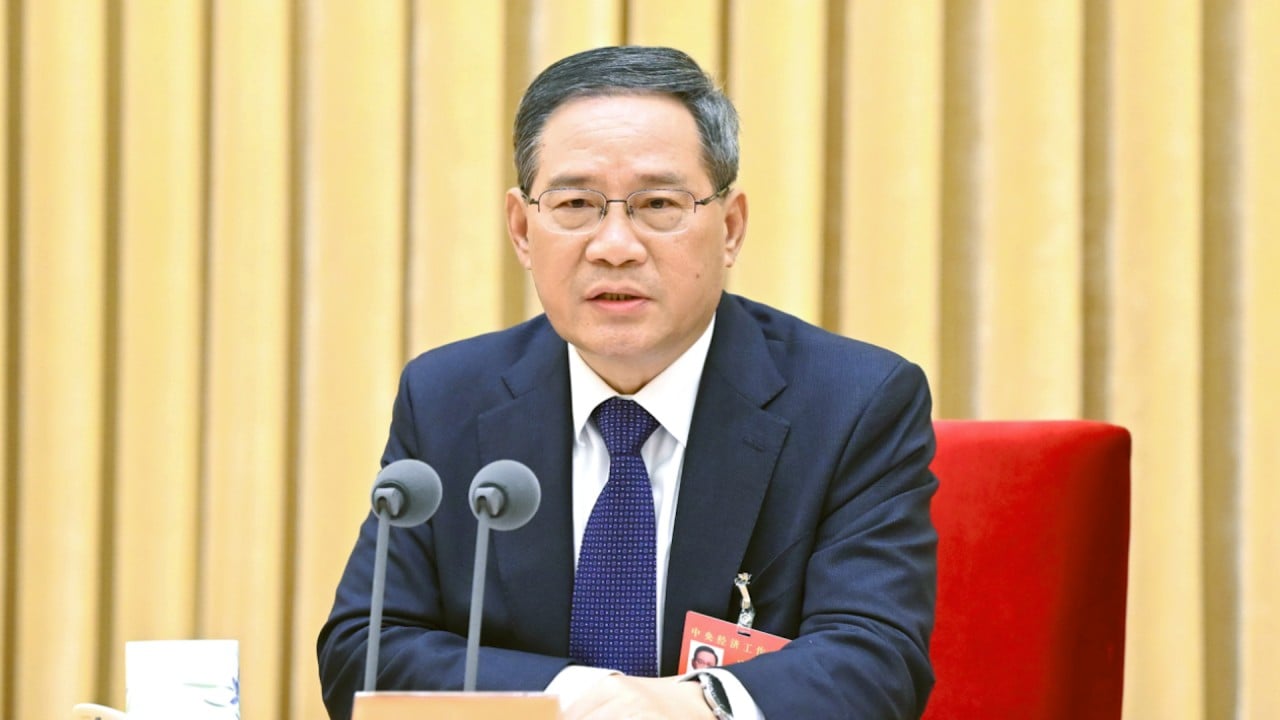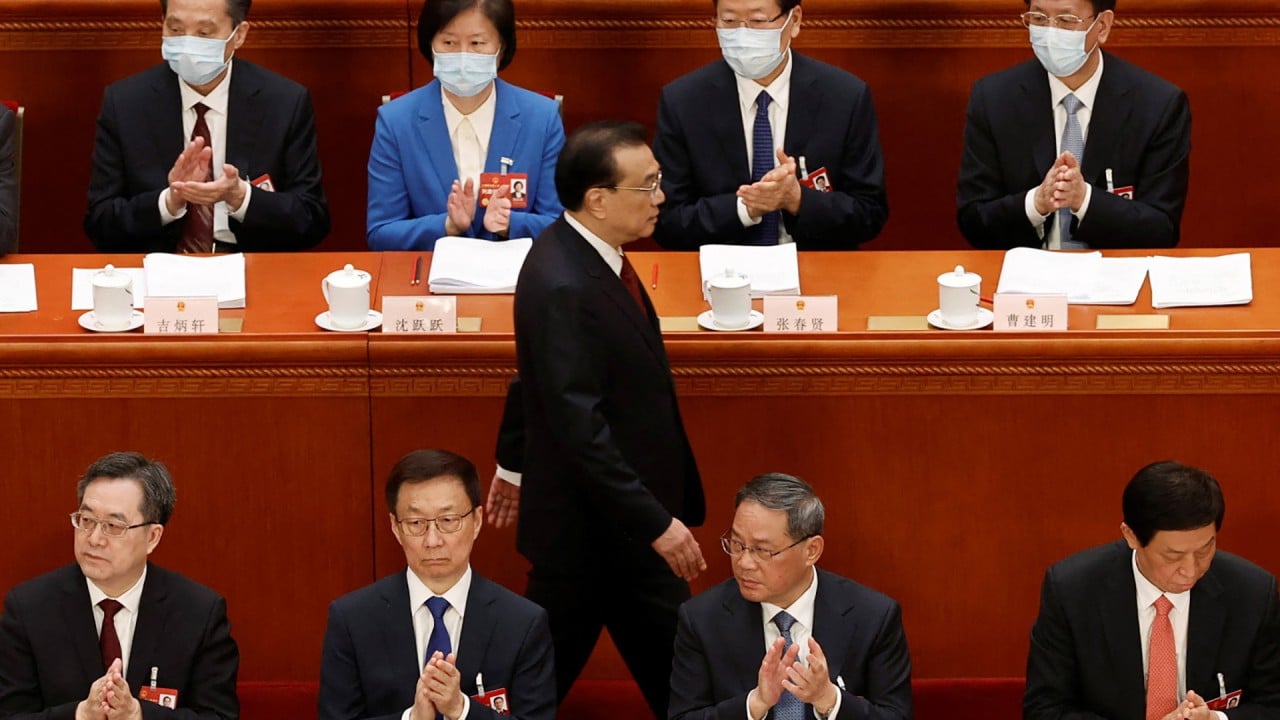
01:55
China’s Li Qiang shakes off Shanghai Covid chaos to become new premier
China’s ‘two sessions’ 2023: Li Qiang is China’s new premier, but how much power will he wield?
- Li Qiang was confirmed as China’s premier – its No 2 official – on Saturday, but the position is seen to hold diminishing authority as President Xi Jinping consolidates power
- However, some observers say the former Shanghai party boss might enjoy more policy leeway on economics thanks to his close relationship with Xi
Li Qiang, a long-time aide of President Xi Jinping, was confirmed as China’s premier – its No 2 official – on Saturday with a resounding vote from members of the National People’s Congress (NPC), the country’s top legislature.
He was endorsed by 2,936 of the 2,947 NPC members who attended Saturday’s meeting, with three voting against and eight abstaining.
Xi and Li chatted before and after the vote, which also approved appointments to the country’s top supervision job as well as its top judge and prosecutor-general.
His predecessor, Li Keqiang, was present to witness the votes announced at the Great Hall of the People, and the two shook hands amid applause to signal the official power transition.
Li Qiang’s biggest challenge will be reviving the Chinese economy this year
Li Qiang will hold his first news conference as premier on Monday after the conclusion of the NPC’s annual meeting. It will be closely watched for signs of his thinking on ways to revive China’s economy from the Covid-19 pandemic doldrums and address economic risks, demographic challenges and technological bottlenecks.
“Li Qiang’s biggest challenge will be reviving the Chinese economy this year,” said Ava Shen, China and Northeast Asia associate at Eurasia Group, a political risk consultancy.
“It’s still uncertain if consumer demand can meaningfully bounce back this year to drive growth, and financial risks in the property sector and local government debt still linger.
“He needs to devise policies to further boost demand while keeping financial risks at bay.”
‘He has room to do something great’: what to expect from China’s next premier
Other analysts said Xi would have the final say, especially if economic issues clashed with long-cherished development security.
“Any understanding about Li Qiang must start with the fundamental fact about his subservient role to Xi,” said Su Fubing, a professor of political science at Vassar College in New York.
Christopher Beddor, deputy China research director at Gavekal Dragonomics, said it was possible Xi would allow some decision-making authority to flow back to the premier.
But the only reason power would return to the premier would be because he was no longer in a quasi-independent role but rather served as Xi’s lieutenant, Beddor said.
Wu Qiang, an independent political analyst based in Beijing, said Li’s appointment essentially put an end to more than 40 years of China’s two-headed governance system – often called the rivalry between southern and northern Zhongnanhai, in a reference to the president and premier’s respective quarters within the Beijing complex that houses Communist Party and state leadership.
“The co-governance situation between the party and the State Council has become harmonious for the first time, and it can also be said that the State Council’s presence has become so weak for the first time,” Wu said.
Wu said the State Council had increasingly taken on the role of an economic cabinet whose main job was to focus on economic development.
“But this does not mean that [Li] will have enough freedom or authority [even on economic issues], as Xi is likely to continue to focus on the economy this year or in the future. Li Qiang is more like a chief executive officer,” he said.
Chen Daoyin, a political scholar focused on China affairs, said Xi would continue to prioritise security over everything in his third term, meaning Li’s actions on economic issues might be constrained, especially if they clashed with security goals.
“He will absolutely not do anything he is not permitted to do, but he will resolutely do everything he can do,” Chen said.
“So there might be a small hope that beyond Xi’s red line, where there is freedom for Li to play, he may have a little breakthrough.”
Facing low business confidence, lacklustre consumer demand, a trembling property sector, a debt crisis among cash-strapped local governments and escalating geopolitical tensions with the United States, the biggest challenge for both Xi and Li remains ensuring the economic recovery stays on track, according to observers.
China’s Li Qiang makes speech for State Council, hinting at premier’s job
Joerg Wuttke, president of the European Union Chamber of Commerce in China, said Li, who had shown good business acumen in Shanghai, faced a difficult start as he had no experience shadowing the sitting premier, and economic sentiment remained subdued.
“The current economic situation is the major problem, as consumption is low, sentiment is low. So for him it is an incredibly difficult start to get the sentiment up and running again,” he said.
“I think [Li] doesn’t have too much time to show how he can turn things around.”
However, the business community is still pinning hopes on the new premier.
“When I asked some of the members of the chamber and also Chinese private entrepreneurs what do you wish the premier to do, the answer was always ‘listen to the market’,” Wuttke said.




